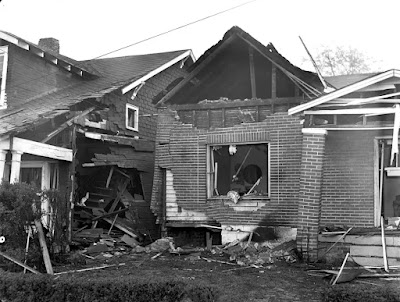By Michelle Shocklee
An explosion rocked a Nashville neighborhood in the early morning hours of April 19, 1960. The target: the home of NAACP leader, city council member, and famed civil rights attorney Z. Alexander Looby. Nashville would never be the same afterwards.
I wasn't born yet when this terrible event happened, but it has touched my world as an author of historical fiction. If you've read my novel
Count the Nights by Stars, you know I make reference to it. Tragically, the reason this horrific event happened is as relevant today as it was in the 60s.
 |
Z. Alexander Looby;
Tennessee Portrait Project |
Z. Alexander Looby was born in Antigua, British West Indies, on April 8, 1899. He was barely five years old when his mother died in childbirth, and he was a teenager when his father died. Orphaned, 15-year old Looby somehow managed to find passage on a ship bound for America and began a new life in the United States.
Looby was a fast learner with a sharp mind. He worked hard to earn a B.A. degree from Howard University, followed by a law degree from Columbia University. He moved to Nashville, Tennessee in 1926 to work as an assistant professor of economics at Fisk University, an all-black school. Three years later he was admitted to the Tennessee bar and practiced in Memphis for three years. There he met Grafta Mosby, a Memphis schoolteacher, and they married in 1934. The next year, the couple relocated to Nashville where Alexander helped found the Kent College for Law for African Americans.
In the 1940s, Looby was president of the James C. Napier Bar Association, an organization of African American attorneys named for the prominent Nashville political activist. He also began working with the NAACP, specifically on a case involving twenty-three African Americans who had been charged with murder following race riots in Columbia, Tennessee. All of the defendants were acquitted.
Looby's work earned him the reputation as someone who would stand up for civil rights no matter what, but it was his work involving the desegregation of schools that earned him the most enemies.
 |
Hattie Cotton Elementary School after an explosion on
Sept. 10, 1957 one day after a black first grader attended school here.
Photo: Bill Preston, The Tennessean |
Shortly after the historic 1954 Brown v. Board of Education ruling that allowed black children to attend formerly all-white schools, Looby filed the first desegregation suit against the Nashville public schools. On September 9, 1957, nineteen black 6-year olds attempted to attend school. Hattie Cotton Elementary school admitted one black student, a brave 6-year-old girl. That night, the school was damaged when a bundle of dynamite exploded. It reopened nine days later and repairs followed in 1958.
When the sit-ins began in Nashville in 1960 at lunch counters throughout the city, many students were arrested on various trumped up charges. Looby became their first attorney. It was during this period that his enemies--white segregationists--wanted him silenced. On the night of April 19, 1960, Looby and his wife were asleep in their bedroom at the back of their home. An unknown person or persons threw a bundle of dynamite toward the house, aiming for a picture window. Thankfully their aim was off, and the dynamite exploded without causing Mr. Looby and his wife harm. However, the blast was so powerful, it destroyed the house and shattered windows throughout the neighborhood and at nearby Meharry Medical College.
 |
Civil rights leader Z. Alexander Looby’s house after being bombed in April 1960 Photo: Nashville Public Library, Special Collections
|
The attempt on Looby's life had the exact opposite effect from what the bombers hoped to achieve. Instead of silencing Looby and those fighting for civil rights, it fired them up. Students from Fisk University led 2500 protesters on a silent walk to city hall, where they confronted Mayor Ben West. One of them, a young woman named Diane Nash, asked him, "Do you feel it is wrong to discriminate against a person solely on the basis of their race or color?" West said "yes," later explaining, "It was a moral question – one that a man had to answer, not a politician." By May of that year, lunch counters in Nashville were desegregated. And by October, Looby and his team gained dismissal of the charges against 91 students arrested for conspiracy to disrupt trade and commerce.
Z. Alexander Looby continued to practice law and fight for civil rights for the remainder of his life. He died in 1972, but his legacy continues today.
(PLEASE VISIT THE BLOG TO COMMENT ON THIS POST.)
Michelle Shocklee is the author of several historical novels, including
Count the Nights by Stars, winner of the 2023
Christianity Today Book Award, and
Under the Tulip Tree, a Christy Awards and Selah Awards finalist. Her work has been included in numerous Chicken Soup for the Soul books, magazines, and blogs. Married to her college sweetheart and the mother of two grown sons, she makes her home in Tennessee, not far from the historical sites she writes about. Visit her online at
www.MichelleShocklee.com
COUNT THE NIGHTS BY STARS
*2023 Christianity Today Book Award Winner*
1961. After a longtime resident at Nashville’s historic Maxwell House Hotel suffers a debilitating stroke, Audrey Whitfield is tasked with cleaning out the reclusive woman’s room. There, she discovers an elaborate scrapbook filled with memorabilia from the Tennessee Centennial Exposition. Love notes on the backs of unmailed postcards inside capture Audrey’s imagination with hints of a forbidden romance . . . and troubling revelations about the disappearance of young women at
the exposition. Audrey enlists the help of a handsome hotel guest as she tracks down clues and information about the mysterious “Peaches” and her regrets over one fateful day, nearly sixty-five years earlier.https://www.tyndale.com/p/count-the-nights-by-stars/9781496459930






Thanks for reading, Connie. =)
ReplyDelete